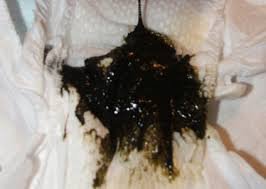Babies are full of surprises, and their poop is no exception! In the early days of a newborn's life, parents are introduced to a special kind of poop known as meconium. Brace yourselves, because this dark, sticky substance is about to shed some light on the fascinating world of baby bowel movements.
Let's explore meconium and why it's perfectly normal for it to be green. Yes, the pic below is entirely NORMAL!
 Meconium: Normal Newborn Poop
Meconium: Normal Newborn Poop
The Meconium Marvel: Meconium is a newborn's first poop, and it's unlike anything you've seen before. It's greenish-black and super sticky but surprisingly doesn't really smell. You might be wondering why it looks so different from the regular poop that follows. Well, during pregnancy, your baby's intestines accumulate waste products from what they're swallowed, things like amniotic fluid, cells and mucus, which give meconium its unique appearance.
The Greenish Tint: This is due to the presence of bile, a substance produced by the liver that aids in digestion. Bile contributes to the breakdown of fats and gives the poop its green color.
While meconium is a natural and expected part of a newborn's early bowel movements, it's important to keep an eye out for any abnormalities. Here's when you should pay attention:
Meconium Red Flags!
- Too early (In Utero): Sometimes babies can have their first poop before they're delivered. This usually indicates they're under some stress and you'll notice that your healthcare providers will try to deliver you quickly. Your baby will also require suctioning of their mouth and nose as soon as they're born. What we're trying to prevent is them breathing in the poop which can cause a serious chest infection.
- Too late (Delayed Meconium): While it's normal for meconium to be passed within the first 24 to 48 hours after birth, a delay in its passage can raise concerns. If your baby hasn't passed meconium within this timeframe, it's important to consult your pediatrician. Delayed meconium may indicate an underlying issue that requires medical attention.
- Too long: (Prolonged Presence) If your baby continues to pass meconium beyond the first few days after birth, it's advisable to consult your pediatrician. This could indicate an issue with your breastmilk supply or their digestive system that requires attention.
- Too hard: (Unusual Consistency): Meconium is typically thick and sticky. However, it might suggest constipation if it becomes excessively hard, dry, or resembles pebbles. Seek medical advice if you observe such changes.
Remember, the transition from meconium to regular baby poop is a positive sign of your little one's growth and development. As the days go by, their poop will change in color, texture, and frequency, reflecting their evolving digestive system. It will become lighter in color and less sticky, this is called transition poops. It's a sign they're digesting their milk and their gut is working properly.
The bottom line (mind the pun!)
Meconium is a fascinating and natural part of a newborn's early journey into the world of digestion. Its greenish color is perfectly normal and signifies the presence of bile. It's their first poop and lasts for a few days. However, if you have concerns about your baby's poop, whether it's the persistence of meconium, delayed passage, or changes in consistency, don't hesitate to reach out to your pediatrician for guidance and reassurance. Embrace the marvels of baby poop and enjoy the adventure of parenthood, one diaper change at a time!


